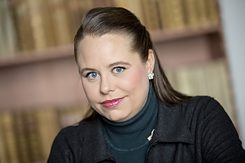Föredrag/Samtal "Toleration and sympathy in immigration societies"
Har Europa fortfarande en gemensam agenda? Vilka perspektiv för en gränsöverskridande demokrati finns i Europa idag? Vilka är Europas värderingar? Vilken roll spelar tolerans i debatten och vilken tolerans menar vi egentligen? Vad kännetecknar den så kallade "Europäischer Sonderweg" sett ur ett världshistoriskt perspektiv?
Kompletterande till utställningen Europa – Humanisternas arv som visas runt om i Sverige vill vi lyfta fram de viktigaste frågorna och utmaningarna som Europa för närvarande står inför. Tanken är att på nytt diskutera europeiska värderingar i den samtida diskursen och därigenom stärka dem.
Volker Heins about "Toleration and sympathy in immigration societies":
We live in times in which many people who are deeply concerned about the rising intolerance toward stigmatized groups such as migrants nevertheless reject the language of tolerance as patronizing, depoliticizing and morally flawed.
Among political philosophers from Herbert Marcuse to Wendy Brown, there is a broad consensus that toleration is a highly ambiguous attitude and a questionable political principle. Toleration is criticized for being both unjust and unstable. Instead of toleration, mutual recognition is championed as a more appropriate democratic ideal. This paper argues that demands of recognition, when overstretched, become incompatible with the growing pluralization of liberal immigration societies. Beyond the social contributions and moral qualities which deserve recognition, there is also a wide range of attitudes and practices which, depending on the perspective, ought to be tolerated even if they cannot be wholeheartedly accepted or embraced. Whereas theories of recognition are often marked by their orientation to harmony – Axel Honneth’s concept of social freedom is a case in point –, theories of toleration are relevant for more realistic thinkers who believe that in fractured societies modus vivendi settlements are sometimes to be preferred to the futile search for a universal consensus. The paper therefore argues for a concept of toleration that cannot be entirely reduced to recognition. Moreover, it discusses two alternative ideals of interaction beyond the opposition of toleration vs. recognition: civil indifference and sympathetic understanding.
Speakers: Volker M. Heins (Universität Duisburg-Essen)
Patricia Mindus (Associate Professor Practical Philosophy, Uppsala University)
Moderation: tbc
English
 privat
Volker M. Heins is Permanent Fellow at the Institute for Advanced Study in the Humanities (KWI) in Essen, Germany, and a member of the Faculty of Social Sciences at the University of Duisburg-Essen. He is also on the executive board of the Centre for Global Cooperation Research at the same university. Recent publications include Anti-immigrant movements and the self-poisoning of the civil sphere: The case of Germany, in: Jeffrey C. Alexander, Trevor Stack, Farhad Khosrokhavar (eds.) Breaching the Civil Order: Radicalism and the Civil Sphere, Cambridge, UK: Cambridge University Press (with Christine Unrau, forthcoming); Kultureller Pluralismus und Kritische Theorie, in: Ulf Bohmann, Paul Sörensen (eds.) Kritische Theorie der Politik, Berlin: Suhrkamp 2019; More Modest and More Political: From the Frankfurt School to the Liberalism of Fear”, in: Samantha Ashenden, Andreas Hess (eds.) Between Utopia and Realism: The Political Thought of Judith N. Shklar, Philadelphia, PA: University of Pennsylvania Press 2019, Gift-giving and reciprocity in global society: Introducing Marcel Mauss in international studies. Journal of International Political Theory, vol. 14, no. 2, 2018 (with Christine Unrau and Kristine Avram).
privat
Volker M. Heins is Permanent Fellow at the Institute for Advanced Study in the Humanities (KWI) in Essen, Germany, and a member of the Faculty of Social Sciences at the University of Duisburg-Essen. He is also on the executive board of the Centre for Global Cooperation Research at the same university. Recent publications include Anti-immigrant movements and the self-poisoning of the civil sphere: The case of Germany, in: Jeffrey C. Alexander, Trevor Stack, Farhad Khosrokhavar (eds.) Breaching the Civil Order: Radicalism and the Civil Sphere, Cambridge, UK: Cambridge University Press (with Christine Unrau, forthcoming); Kultureller Pluralismus und Kritische Theorie, in: Ulf Bohmann, Paul Sörensen (eds.) Kritische Theorie der Politik, Berlin: Suhrkamp 2019; More Modest and More Political: From the Frankfurt School to the Liberalism of Fear”, in: Samantha Ashenden, Andreas Hess (eds.) Between Utopia and Realism: The Political Thought of Judith N. Shklar, Philadelphia, PA: University of Pennsylvania Press 2019, Gift-giving and reciprocity in global society: Introducing Marcel Mauss in international studies. Journal of International Political Theory, vol. 14, no. 2, 2018 (with Christine Unrau and Kristine Avram). Foto: Mikael Wallerstedt
Patricia Mindus is Professor in Practical Philosophy at Uppsala University, Sweden and Director of the Uppsala Forum for Democracy, Peace and Justice. As a political and legal philosopher she is especially interested in citizenship, democratic theory, and migration and has developed the functionalist theory of citizenship. In recent years she has directed several interdisciplinary projects on citizenship and migration policy in the EU and her recent work deals with European citizenship after Brexit.
Foto: Mikael Wallerstedt
Patricia Mindus is Professor in Practical Philosophy at Uppsala University, Sweden and Director of the Uppsala Forum for Democracy, Peace and Justice. As a political and legal philosopher she is especially interested in citizenship, democratic theory, and migration and has developed the functionalist theory of citizenship. In recent years she has directed several interdisciplinary projects on citizenship and migration policy in the EU and her recent work deals with European citizenship after Brexit.